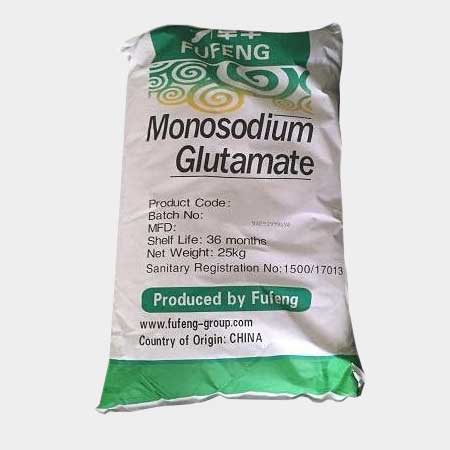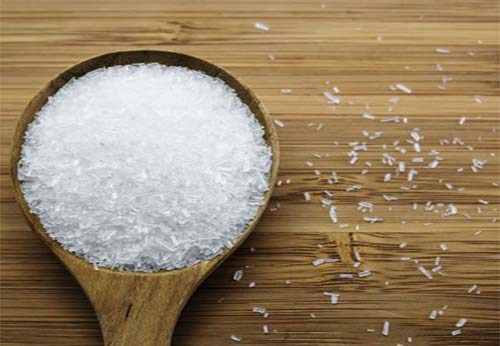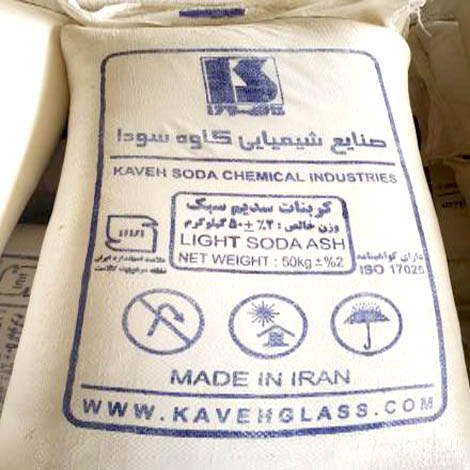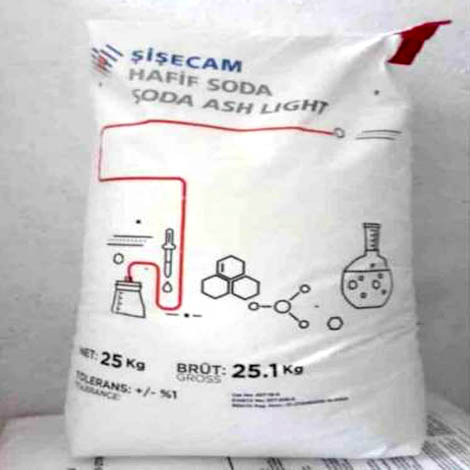light sodium carbonate
Sodium carbonate, Na2CO3, (also known as washing soda, soda ash and soda crystals) is the inorganic compound with the formula Na2CO3 and its various hydrates. All forms are white, water-soluble salts. All forms have a strongly alkaline taste and give moderately alkaline solutions in water. Historically it was extracted from the ashes of plants growing in sodium-rich soils. Because the ashes of these sodium-rich plants were noticeably different from ashes of wood (once used to produce potash), sodium carbonate became known as "soda ash." It is produced in large quantities from sodium chloride and limestone by the Solvay process.
Main applications
In terms of its largest applications, sodium carbonate is used in the manufacture of glass, paper, rayon, soaps, and detergents.
Monosodium glutamate
Monosodium glutamate (MSG), also known as sodium glutamate, is the sodium salt of glutamic acid. MSG is found naturally in some foods including tomatoes and cheese. MSG is used in cooking as a flavor enhancer with an umami taste that intensifies the meaty, savory flavor of food, as naturally occurring glutamate does in foods such as stews and meat soups.
MSG was first prepared in 1908 by Japanese biochemist Kikunae Ikeda, who was trying to isolate and duplicate the savory taste of kombu, an edible seaweed used as a base for many Japanese soups. MSG balances, blends, and rounds the perception of other tastes. MSG is commonly found in stock (bouillon) cubes, soups, ramen, gravy, stews, condiments, savory snacks, etc.
The U.S. Food and Drug Administration has given MSG its generally recognized as safe (GRAS) designation. It is a popular belief that MSG can cause headaches and other feelings of discomfort, known as "Chinese restaurant syndrome", but blinded studies show no such effects when MSG is combined with food in normal concentrations, and are inconclusive when MSG is added to broth in large concentrations. The European Union classifies it as a food additive permitted in certain foods and subject to quantitative limits. MSG has the HS code 29224220 and the E number E621.
Sodium carbonate (Maragheh)
Sodium carbonate, Na2CO3, (also known as washing soda, soda ash and soda crystals) is the inorganic compound with the formula Na2CO3 and its various hydrates. All forms are white, water-soluble salts. All forms have a strongly alkaline taste and give moderately alkaline solutions in water. Historically it was extracted from the ashes of plants growing in sodium-rich soils. Because the ashes of these sodium-rich plants were noticeably different from ashes of wood (once used to produce potash), sodium carbonate became known as "soda ash." It is produced in large quantities from sodium chloride and limestone by the Solvay process.
Main applications
In terms of its largest applications, sodium carbonate is used in the manufacture of glass, paper, rayon, soaps, and detergents.
Sodium carbonate (Semnan)
Sodium carbonate, Na2CO3, (also known as washing soda, soda ash and soda crystals) is the inorganic compound with the formula Na2CO3 and its various hydrates. All forms are white, water-soluble salts. All forms have a strongly alkaline taste and give moderately alkaline solutions in water. Historically it was extracted from the ashes of plants growing in sodium-rich soils. Because the ashes of these sodium-rich plants were noticeably different from ashes of wood (once used to produce potash), sodium carbonate became known as "soda ash." It is produced in large quantities from sodium chloride and limestone by the Solvay process.
Main applications
In terms of its largest applications, sodium carbonate is used in the manufacture of glass, paper, rayon, soaps, and detergents.
Sodium carbonate (Turkey)
Sodium carbonate, Na2CO3, (also known as washing soda, soda ash and soda crystals) is the inorganic compound with the formula Na2CO3 and its various hydrates. All forms are white, water-soluble salts. All forms have a strongly alkaline taste and give moderately alkaline solutions in water. Historically it was extracted from the ashes of plants growing in sodium-rich soils. Because the ashes of these sodium-rich plants were noticeably different from ashes of wood (once used to produce potash), sodium carbonate became known as "soda ash." It is produced in large quantities from sodium chloride and limestone by the Solvay process.
Main applications
In terms of its largest applications, sodium carbonate is used in the manufacture of glass, paper, rayon, soaps, and detergents.








